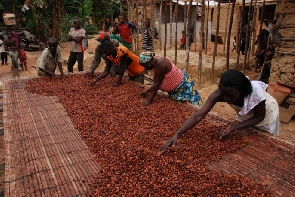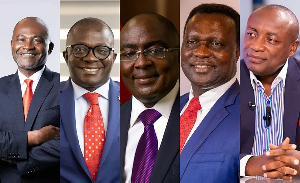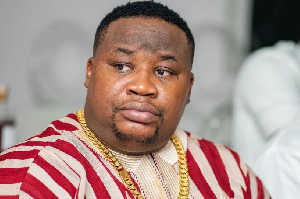Many of Ghana’s cocoa farmers are expecting an increase in cocoa producer prices come October this year, when new farm gate prices are fixed for the 2019-2020 crop year.
This may put them on a collision course with government which is under pressure from the International Monetary Fund to reduce, rather than increase the producer price for the next crop season in the face of stuttering world market prices and COCOBOD’s own rising financial deficit. So far government insists it will not reduce the next producer price but an increase is unlikely too.
On Thursday May 30, 2019, purchases for the 2018/2019 main crop cocoa season ceased.
A statement signed by Mr Joseph Boahen Aidoo, CEO of COCOBOD, earlier this month said, “to assist the Licensed Buying Companies (LBCs) to obtain the final returns from up-country centres, COCOBOD had decided that returns on the declared purchases would be accepted up to 1600 hours on Thursday, June 6, 2019.”
Producers have already started hoping that the upcoming season will bring them increased sales through higher producer prices which will be determined by both the government and COCOBOD. Farmers point to a 5.1 percent rise in Cocoa prices over the 12 months up to April 2019 – to an average of US$2,370.4 per tonne -as rationale for an increase in the local producer price. They believe that a price rally on international markets is in the offing but both government and the Bank of Ghana disagree with their optimistic forecasts.
While the current producer price, when juxtaposed against the international market price suggests that government is making huge profits at their expense, when the cost of COCOBOD’s support is added on as well as financing costs, the state run cocoa industry regulator and facilitator is left with a significant financial loss at current prices which is why the IMF wants government to cut the producer price.
However, government, with one eye on the need to motivate the shrinking cocoa cultivating work force and the other on the over one million votes cast by cocoa reliant households, is loath to do so.
It is instructive that, government maintained the price of cocoa at GHc7, 600 per tonne for the 2018/2019 crop year, the same producer price as in the 2016/2017 cocoa season.
But a cocoa research lead and lecturer at the University of Ghana, Prof. Kwabena Asomanin Anaman, argues that, government must consider raising the price by a reasonable amount to meet the expectations of cocoa farmers across the country.
Prof Asomanin speaking to the Goldstreet Business at a cocoa advocacy event on farmgate pricing and income of cocoa farmers said, cocoa farmers play little or no role in the determination and setting of local cocoa producer prices.
A study by SEND Ghana, and other partners including INKOTA netzwerk and Rainforest Alliance has been concluded to ascertain the perception of 90 cocoa farmers who between them own 220 farms in the Western Region, about their input into cocoa producer price determination.
All 90 farmers expressed their concern about perceived weighing scale adjustment fraud at the point of sale of dried cocoa beans at buying centres and depots.
The study also discloses that the two most important actors in cocoa pricing, COCOBOD and the Government of Ghana – including the local cocoa purchasing clerks – are not trusted by farmers with regards to transparency in pricing.
The study recommends that COCOBOD should strengthen its public education on the processes involved in the determination of local cocoa producer prices.
COCOBOD according to the study, should also consider expanding the number of farmer representatives over a period of time before the announcement of official local cocoa prices during the first week of October each year.
Business News of Tuesday, 11 June 2019
Source: goldstreetbusiness.com













